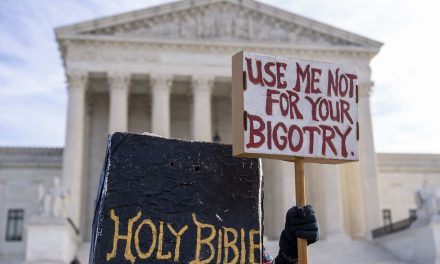
Six Republicans on the Supreme Court recently announced, a story that has largely flown under the nation’s political radar, that they will consider pre-rigging the presidential election of 2024.
Here is how one aspect of it could work out, if they go along with the GOP’s arguments that will be before the Court this October:
It is November, 2024, and the presidential race between Biden and DeSantis has been tabulated by the states and called by the networks. Biden won 84,355,740 votes to DeSantis’ 77,366,412, clearly carrying the popular vote.
But the popular vote is not enough: George W. Bush lost to Al Gore by a half-million votes and Donald Trump lost to Hillary Clinton by 3 million votes but both ended up in the White House. What matters is the Electoral College vote, and that looks good for Biden, too.
As CNN is reporting, the outcome is a virtual clone of the 2020 election: Biden carries the same states he did that year and DeSantis gets all the Trump states. It is 306 to 232 in the Electoral College, a 74-vote Electoral College lead for Biden, at least as calculated by CNN and the rest of the media. Biden is heading to the White House for another 4 years.
Until the announcement comes out of Georgia. Although Biden won the popular vote in Georgia, their legislature decided it can overrule the popular vote and just awarded the state’s 16 electoral votes to DeSantis instead of Biden.
An hour later we hear from five other states with Republican-controlled legislatures where Biden won the majority of the vote, just like he had in 2020: North Carolina (15 electoral votes), Wisconsin (10), Michigan (16), Pennsylvania (20) and Arizona (11).
Each has followed Georgia’s lead and their legislatures have awarded their Electoral College votes — even though Biden won the popular vote in each state — to DeSantis.
Thus, a total of 88 Electoral College votes from those six states move from Biden to DeSantis, who is declared the winner and will be sworn in on January 20, 2025.
Wolf Blitzer announces that DeSantis has won the election, and millions of people pour into the streets to protest. They are met with a hail of bullets as Republican-affiliated militias have been rehearsing for this exact moment.
Just as happened when Pinochet’s militias shot into crowds as he took over Chile, Mussolini’s volunteer militia the Blackshirts killed civilians as he took over Italy, and Hitler’s volunteer Brownshirts did the same in Germany, their allies among the police refuse to intervene.
After a few thousand people lay dead in the streets of two dozen cities, the police begin to round up the surviving “instigators,” who are charged with seditious conspiracy for resisting the Republican legislatures of their states.
After he is sworn in on January 20th, President DeSantis points to the ongoing demonstrations, declares a permanent state of emergency, and suspends future elections, just as Trump had repeatedly told the world he planned for 2020.
Sound far fetched?
Six Republicans on the Supreme Court just announced that one of the first cases they will decide next year could include whether that very scenario is constitutional or not. And at least 5 of the Republicans on this Court will almost certainly say that it is.
Article II, Section 1 of the Constitution lays out the process clearly, and it does not even once mention the popular vote or the will of the people:
“Each State shall appoint, in such Manner as the Legislature thereof may direct, a Number of Electors, equal to the whole Number of Senators and Representatives to which the State may be entitled in the Congress… [emphasis added]
“The Electors shall meet in their respective States, and vote by Ballot for two Persons … which List they shall sign and certify, and transmit sealed to the Seat of the Government of the United States, directed to the President of the Senate. The President of the Senate shall, in the Presence of the Senate and House of Representatives, open all the Certificates, and the Votes shall then be counted. The Person having the greatest Number of Votes shall be the President…”
It is not particularly ambiguous, even as clarified by the 12th Amendment and the Electoral Count Act of 1887.
Neither mentions the will of the people, although the Electoral Count Act requires each state’s governor to certify the vote before passing it along to Washington, DC. And half of those states have Democratic governors.
Which brings us to the Supreme Court’s probable 2023 decision. As Robert Barnes wrote yesterday for The Washington Post:
“The Supreme Court on Thursday said it will consider what would be a radical change in the way federal elections are conducted, giving state legislatures sole authority to set the rules for contests even if their actions violated state constitutions and resulted in extreme partisan gerrymandering for congressional seats.”
While the main issue being debated in Moore v Harper, scheduled for a hearing this October, is a gerrymander that conflicts with North Carolina’s constitution, the issue at the core of the debate is what known as the “Independent State Legislature Doctrine.”
It literally gives state legislatures the power to pre-rig or simply hand elections to the candidate of their choice.
As NPR noted:
“The independent state legislature theory was first invoked by three conservative U.S. Supreme Court justices in the celebrated Bush v. Gore case that handed the 2000 election victory to George W. Bush. In that case, the three cited it to support the selection of a Republican slate of presidential electors.”
Those three were Rehnquist, Scalia, and Clarence Thomas, now the seniormost member of the Court. They wrote in their concurring opinion in Bush v Gore:
“The federal questions that ultimately emerged in this case are not substantial. Article II provides that “[e]ach State shall appoint, in such Manner as the Legislature thereof may direct, a Number of Electors.” … But as we indicated in our remand of the earlier case, in a Presidential election the clearly expressed intent of the legislature must prevail.”
That doctrine — the basis of John Eastman and Donald Trump’s effort to get states to submit multiple slates of electors — asserts that a plain reading of Article II and the 12th Amendment of the Constitution says that each state’s legislature has final say in which candidate gets their states’ Electoral College vote, governors and the will of the voters be damned.
Fully twenty-one years before Trump tried the same trick, David Barstow and Somini Sengupta wrote for The New York Times on November 28, 2000 that Jeb and George W. Bush were discussing it:
“The president of Florida’s Senate said today that Governor Jeb Bush had indicated his willingness to sign special legislation intended to award Florida’s 25 Electoral College votes to his brother Gov. George W. Bush of Texas even as the election results were being contested.”
Barstow and Sengupta added, 22 years ago:
“[T]alk of a special legislative session continued unabated here today as local Republicans fretted about the possibility that the justices on the Florida Supreme Court, all appointed by Democrats, might uphold the challenge by Vice President Al Gore [for a statewide recount], ultimately awarding him the state’s electoral votes.”
As I wrote eight months before the 2020 election, predicting that Trump would do what Bush considered trying twenty years earlier:
Thus, through simple brute force, if Trump, Fox News and Limbaugh, et al, were to loudly claim that there was “voter fraud” in any or all of those states and succeed in casting doubts about the integrity of an election that would put a Democrat in the White House, the manufactured conflict could be resolved [in the House] and the election given to Trump by one or more state legislatures as Florida threatened to do in 2000.
This has been a long time coming. The Republicans point out that the Constitution says that it is up to the states — “in such Manner as the Legislature thereof may direct” — to decide which presidential candidate gets their Electoral College votes.
But the Electoral Count Act requires a governor’s sign-off, and half those states have Democratic governors. Which has precedence, the Constitution or the Act?
If the Supreme Court says it is the US Constitution rather than the Electoral Count Act, states’ constitutions, state laws, or the votes of their citizens, the scenario outlined above becomes not just possible but very likely. Republicans, answering to their rightwing billionaire donors rather than voters, play hardball and consistently push to the extremes regardless of pubic opinion.
After all, the Constitution only mentions the states’ legislatures — which are all Republican controlled — so the unwillingness of the Democratic governors of Michigan, North Carolina, Wisconsin and Pennsylvania to sign off on the Electoral College votes becomes moot.
Under this circumstance DeSantis becomes president, the third Republican president in the 21st century, and also the third Republican President to have lost the popular vote election yet ended up in the White House.
This scenario is not just plausible: it is probable. GOP-controlled states are already changing their state laws to allow for it, and Republican strategists are gaming out which states have Republican legislatures willing to override the votes of their people to win the White House for the Republican candidate.
Those state legislators who still embrace Trump and this theory are getting the support of large pools of rightwing billionaires’ dark money. As the highly respected conservative Judge J. Michael Luttig recently wrote:
“Trump and the Republicans can only be stopped from stealing the 2024 election at this point if the Supreme Court rejects the independent state legislature doctrine … and Congress amends the Electoral Count Act to constrain Congress’ own power to reject state electoral votes and decide the presidency.”
I take no satisfaction in having accurately predicted — in March of 2020 — how Trump and his buddies would try to steal the election in January of 2021. Or how the Supreme Court would blow up the Environmental Protection Agency.
Trump’s January 6th effort failed because every contested state had laws on the books requiring all of their Electoral College votes to go to whichever candidate won the popular vote in the state.
That will not be the case in 2024. As we are watching, the Supreme Court — in collaboration with state legislatures through activists like Ginny Thomas — are setting that election up right now in front of us in real time. It is likely coming our way in just a bit more than two short years.
© Thom Hartmann, used with permission. Originally published on The Hartmann Report as The Nightmare Scenario SCOTUS is Plotting For the 2024 Election Takeover
Subscribe to The Hartmann Report directly and read the latest views about U.S politics and other fascinating subjects seven days a week.














